The Provence-Alpes-Côte d’Azur region, with a population of about five million, makes up the vast south-east corner of France, stretching east along the Mediterranean coast from Marseille, the regional capital, to the Riviera border with Italy and, further north inland, from the ancient papal city of Avignon east to the foothills of the Alps.
It is also here that the far-right Front National party is hoping to make history in regional elections played out on December 6th and 13th, for it is one of two regions where the party is tipped by opinion polls and observers alike as having a very real chance of taking control of the ruling council.
While FN leader Marine Le Pen is eyeing the presidency of the north-east Nord-Pas-de-Calais region, it is her niece, Marion Maréchal-Le Pen, who hopes to grab that lying at the south-east end of the country, Provence-Alpes-Côte d’Azur (PACA).
The electorate of the PACA region has for decades been largely anchored to the Right which has a clear majority among its parliamentary constituencies (almost twice as many as the Left) and a higher numbers of senators. In the 2012 presidential elections which saw socialist candidate François Holland beat conservative rival Nicolas Sarkozy, garnering 51.6% of votes cast nationally, Hollande drew just 42.4% of the vote in PACA, against Sarkozy’s 57.6%.
The Left, meanwhile, has held its ground at a local level, and notably on the regional council, where the Socialist Party has held a majority since 1998. But that 17-year reign now appears certain to have reached an end, and beyond that the party is expecting a serious drubbing.
The elections are being principally fought between three parties, namely the Socialist Party, the conservative opposition Les Républicains party (LR) - formerly the UMP - and the far-right Front National. Each are fielding a list of candidates divided among the four départements (counties) of the region, and with a lead candidate who, in case of his or her party’s victory, will become the regional council president.
The LR lead candidate is Christian Estrosi, mayor of Nice. This former minister under Nicolas Sarkozy has caused controversy with claims that “Islam is not compatible with the [French] republic” and that “an identity card doesn’t make someone French”. He now accuses the FN’s candidate for presidency of the region, Marion Maréchal-Le Pen, of making Muslims her “scapegoats”.
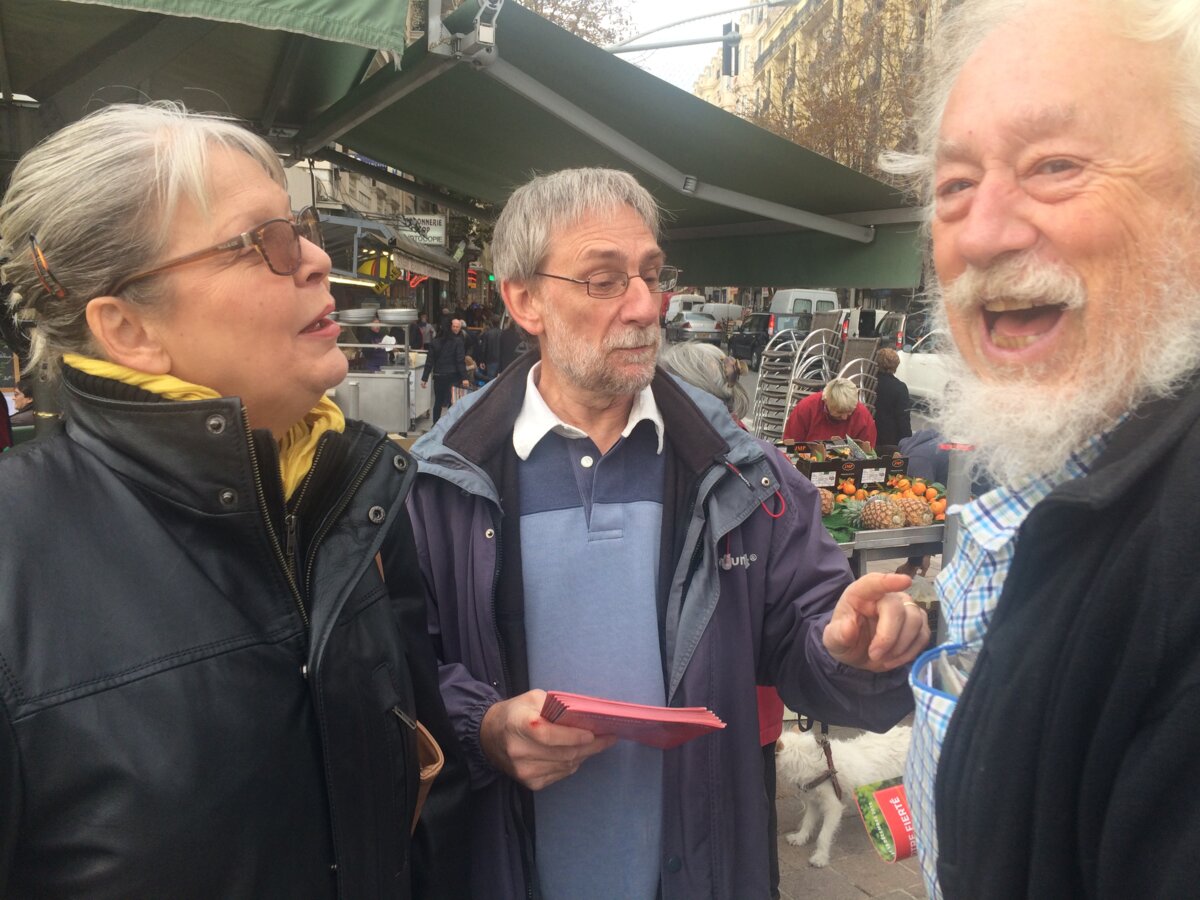
Enlargement : Illustration 1

Mediapart travelled to Nice in early and late November, before and after the terrorist attacks in Paris on Novemeber 13th, to meet with left-wing militants – socialist, radical left and Greens – who in their vast majority are preparing for a rout. For even as the opinion surveys indicate the Left will lose control of the outgoing, socialist-led council, the divisions among the parties of the Left are also destroying what little ground they likely had left. Added to which the lead candidate for the main party of the Left, the Socialist Party, Christophe Castaner, is – unlike his rivals – virtually unknown to voters in the region.
It was a Saturday morning when Mediapart caught up with local socialist municipal councillor Christine Dorejo while she and other militants were out canvassing for Castaner amid the food market close to the Place de la Libération in the centre-south of Nice. Most of the political parties were also campaigning around the market that day, from the FN to the EELV Green party. She says she is well aware of the problems faced by the Socialist Party, but remains hopeful. “We’re not, all the same, in ‘Estroland’,” she protested, referring to Nice mayor Christian Estrosi, who is also a Member of Parliament (MP) for a constituency that covers both a part of Nice and a swathe of the surrounding Riviera.
“There’re also people from the Left here,” insists Dorejo. Amid the toing and froing of shoppers, she came across a few acquaintances she knew from local associations and trades union branches. “Come on, you mustn’t muck around, it’s really important this time,” she said to one, prompting him into a loud burst of laughter before heading off.
Also canvassing with Dorejo was Michel Bordes, standing for election as a regional councillor on the list of socialist candidates presented in the Alpes-Maritimes département. “We want to believe in it, even if it’s true that in Nice, it’s a bit more complicated,” said Bordes. “Complicated” would be too neutral a word to describe a scenario that until now would have seem unimaginable to the Socialist Party activists, namely their voluntary withdrawal from the election contest after the first round in favour of the conservative list headed by Christian Estrosi. That would be in the case of a strong showing by the far-right Front National (FN) in the first round this Sunday, when the socialists come in a poor third and, to avoid a split in the vote for the mainstream parties that would allow the FN to come first in the final round vote on December 13th, they call on their electorate to support Estrosi.
But this principled suicide performed to keep power out of the hand of extremist politics would for many be unpalatable. Estrosi, who served in three ministerial posts during the presidency of Nicolas Sarkozy, is himself a self-caricatured hardman of the conservative Right. As mayor of Nice, he imposed a municipal decree in 2012 outlawing “noisy” marriage ceremonies – a move targeting above all the nuptial parties of families of immigrant origins – and another in 2014, during the football world cup competition, banning “the ostentatious use of foreign flags”.
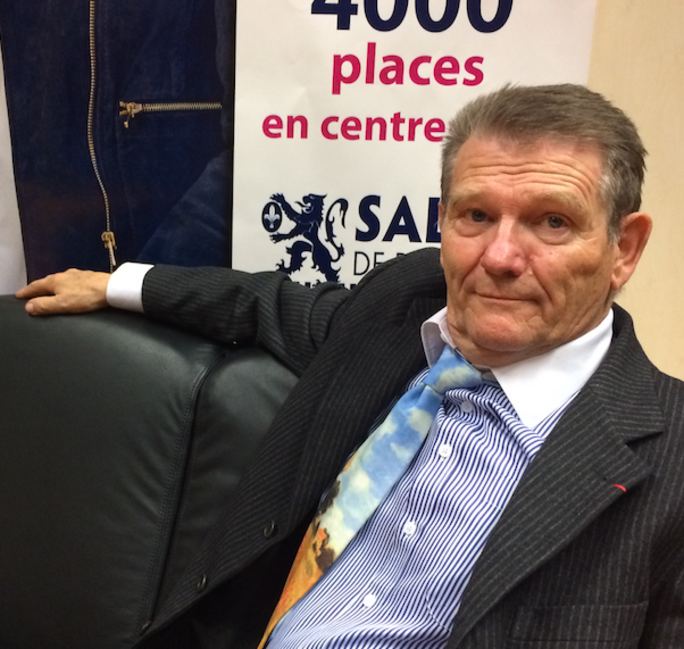
Enlargement : Illustration 2

The lead socialist candidate for the PACA regional council, Christophe Castaner, has until now avoided presenting the scenario of a post-first-round withdrawal of the list of his underling candidates in the Alpes-Maritimes département, fearful of demobilizing the already dwindling number of his party’s militants. But many Socialist Party activists who spoke to Mediapart believe that there will be no other choice than to do so. With opinion polls predicting a strong FN score, the threat of the far-right grabbing power of the region has never before been so real.
“The Left cannot win,” commented Yves Vidal, mayor of Grans in the Bouches-du-Rhône département surrounding Marseille, whose centre-left PRG party is allied to the socialists. He has already reluctantly accepted as inevitable that he will, after the first-round result, vote for the conservative list supporting Christian Estrosi as future president of the regional council even if the latter “is not my cup of tea”, to keep out the FN.
“Previously, the Front [National] would regress in the second round because people returned to a vote that was useful,” he said. “Now it is established that it progresses. Even if Marion Maréchal-Le Pen wins ‘only’ the Vaucluse and the Bouches-du-Rhône, she gets 50 [elected councilors], Estrosi 42 or 43, the Left 25 to 26. That means that if the Left abstains, she’s elected [as regional council president].”
If on Sunday the total of votes for the Left is anything less than equal to those of the conservative Right led by Estrosi, then the socialists will face the Cornelian dilemma. Christophe Castaner can either pull his list out of the race for the second round, or negotiate some sort of fusion with the conservatives.
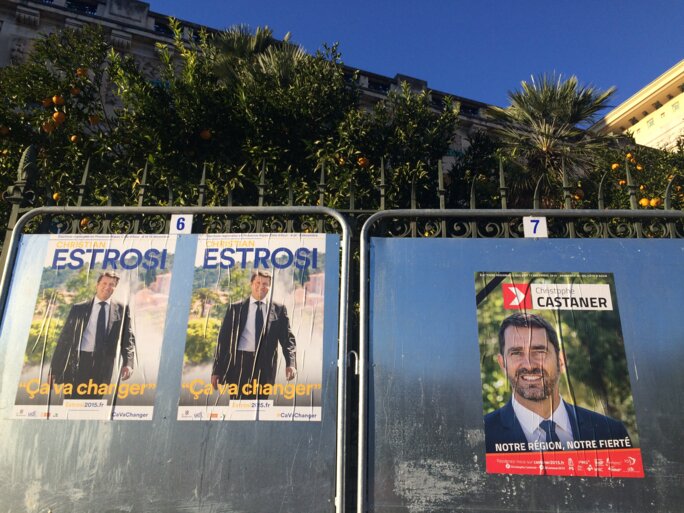
Enlargement : Illustration 3

That last option appears the least likely, given the political inconsistency of such a move and the confusion it would cause, falling into the hands of FN’s argument that the socialists and the conservatives are really just the same party at heart. “It would open up a boulevard for the FN,” said one of Castaner’s close supporters, speaking on condition of anonymity. “Even Estrosi himself hasn’t allowed for that.” Indeed, it appears that Estrosi is banking on the first of the two options, that of a socialist pullout. Before the Paris terrorist attacks on November 13th, after which he changed his tack, Estrosi had adopted a conciliatory approach to the centre-right and centre-left, and even to a degree beyond. “He’s never been so kind to us,” commented Christine Dorejo. “I don’t like this notion of Right and Left,” Estrosi said in an interview with Mediapart. “I feel so different top the comments that are made about me. In my city, everyone knows that I’m more socialist than the socialists, and more ecologist than the Greens.”
Estrosi, who has previously denounced the existence in France of a “fifth column of Islamo-fascists”, has even won over support for his campaign from Mourad Boudjellal, publisher and president of Toulon rugby club, a self-proclaimed “man of Left” and outspoken opponent of the FN.
But socialist municipal councillor Patrick Allemand, who heads Christophe Castaner’s list in the Alpes-Maritime department, dismisses the image. “I’ve seen the mayor of Nice skidding off the rails, with a hardening of his arguments,” he said. “By dint of multiplying statements that are close to [those of] the FN, he has liberated voters to move to the far-right. He’s in the process of paying for all of his work.”
'To talk about refugees is to frighten France even more'
Sat around a table in a restaurant in the Nice suburb of La Trinité on the evening of November 28th, Patrick Allemand and Ladislas Polski, spokesman for Christophe Castaner, were waiting waited for their party militants to join them after the afternoon’s canvassing. Both men agreed that Christian Estrosi was now, for the first time in a long while, placed in difficulty by the FN and that it was his entirely of his own doing.
They both viewed this fact as making it all the more important that the socialists maintain their list of candidates into the second run. “For us, who know him [Estrosi], his campaign support committee is truly staggering.” said Polski, as he and Allemand Polski said it was insufficiently recognised that Estrosi was “a baby Médecin”, referring to the late Jacques Médecin, controversial right-wing mayor of Nice from 1965-1990. “The same Médecin who said he shared 99.9% of the FN’s arguments,” said Polski, adding that withdrawing the socialist candidates to allow Estrosi’s list to win in face of the FN would be “complicated because those people aren’t [democratic] republicans”.
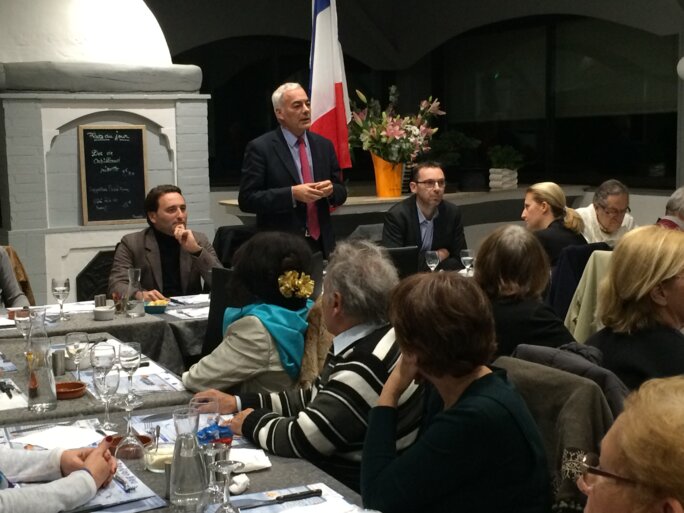
Enlargement : Illustration 4

That is about the one only thing upon which the Greens agree with the socialists. The EELV party chose to fight the campaign not with the Socialist Party but with the radical-left Front de Gauche (which sat alongside the socialists in the outgoing regional council), which Green activist Nadège Bonfils said was a decision taken at a regional level. Jean-Marc Coppola, spokesman for the Communist Party - part of the Front de Gauche – said their alliance was in order “to offer an alternative to voters who do not want to lend approval to the socialist government’s austerity policies”. Socialist party lead candidate Christophe Castaner, who is a Member of Parliament for a constituency in the region’s northern Alpes-de-Haute-Provence département, was one of the rapporteurs for finance minister Emmanuel Macron’s bill of economic reforms, decried by the Left of the ruling Socialist Party.
“There is something a little irresponsible in the approach of the EELV and the Front de Gauche,” said Polski, while Patrick Allemand underlined that “we have managed the region together and we are collectively proud of our results”. The divisions within the Left are all the more surprising given that after the November attacks in Paris the socialists, the Front de Gauche and the EELV all campaigned around the same themes of solidarity, of living together, of collective values.
Feiza Ben Mohamed is the spokeswoman for the Federation of Muslims of the South, an apolitical association based in Nice. She spoke of her satisfaction at having been able to rally what she said was more than one thousand people in a demonstration of support for the refugees arriving in Europe, but that since the Paris attacks “the combat no longer has a voice”.
“In the current context, to talk about refugees is to frighten France even more,” said Ben Mohamed.
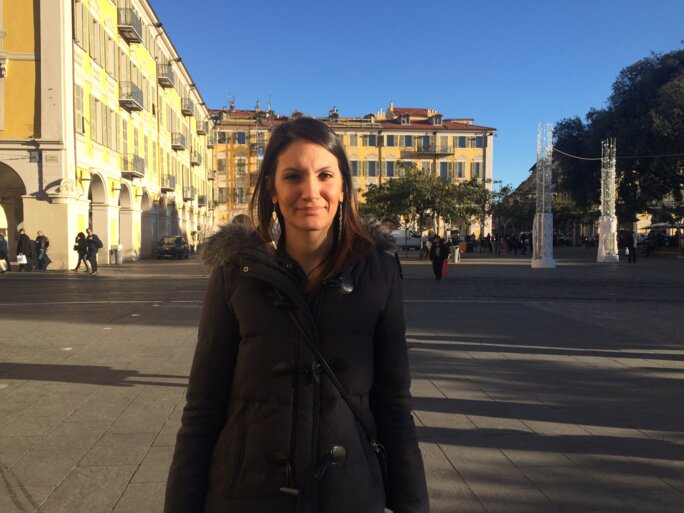
Enlargement : Illustration 5

There have been numerous reports of racist incidents in Nice since the November attacks. These include a veiled woman who was refused a seat on the tramway because “you’ve already taken a hundred youngsters”, and long-term inhabitants of a building in the centre of the city who were called upon to “go home”.
Dominique Manigan is head of the list of candidates fielded by the newly-formed left-wing Nouvelle Donne party. “During the week that followed the attacks people needed to talk together,” he said. “Now they’re more inward looking. There is fear, there is distrust.” Socialist councillor Christine Dorejolaments that “we didn’t do enough for people to meet together”.
-------------------------
UPDATE on Monday December 7th: The first-round vote on Sunday December 6th saw Front National lead candidate Marion Maréchal-Le Pen arrive in first place with 40.55% of votes cast, with conservative lead candidate (Les Républicains) Christian Estrosi in second position with 26.48% and Socialist Party lead candidate Christophe Castaner in third place with 16.59%. Castaner subsequently announced he was withdrawing the socialist list from the elections, in line with the order of the Socialist Party leader Jean-Christophe Cambadélis, in favour of Estrosi and in order to defeat the Front National.
-------------------------
- The French version of this article can be found here.


